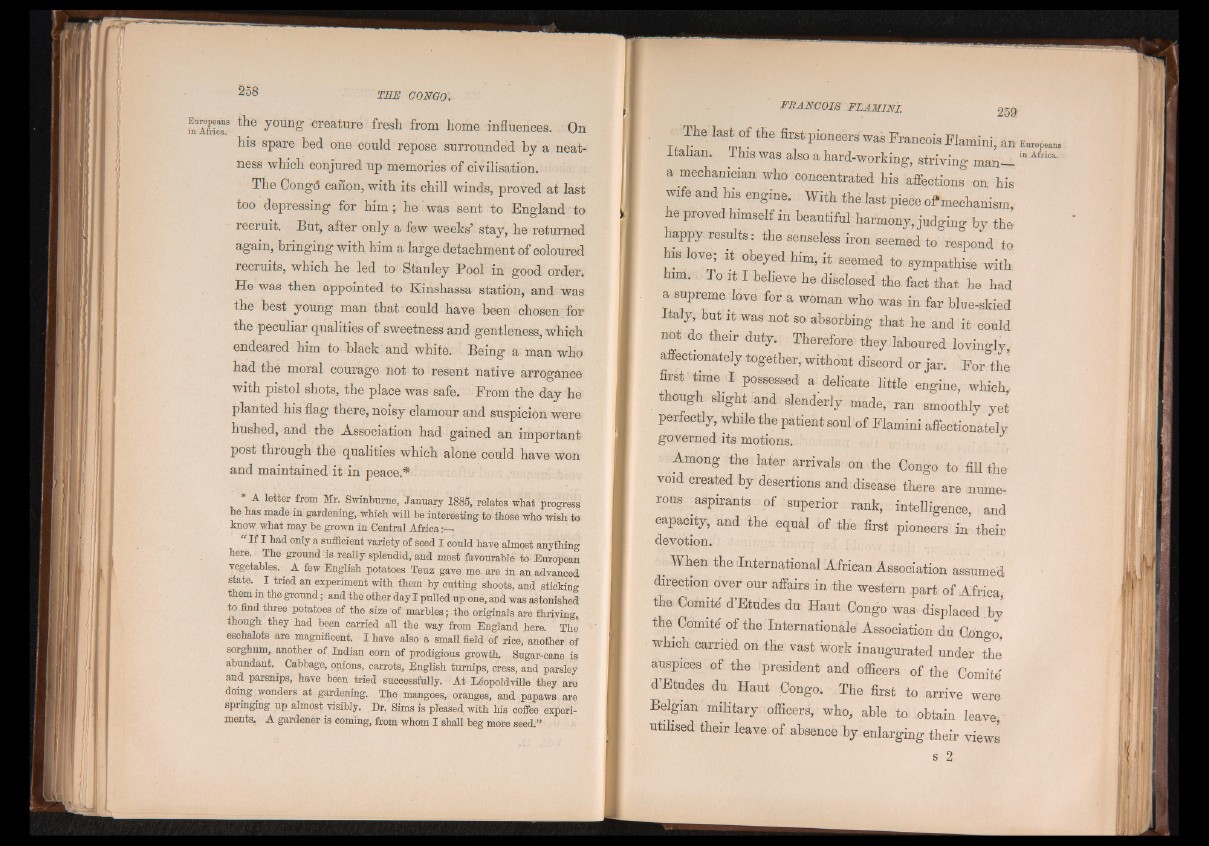
fnTlieT the youn£ creature fresh from home influences. On
his spare bed one could repose surrounded by a neatness
which conjured up memories of civilisation.
The Congd canon, with its chill winds, proved at last
too depressing for him;, he was sent to England to
recruit. But, after only a few weeks’ stay, he returned
again, bringing with him a large detachment of coloured
recruits, which he led to Stanley Pool in good order.
He was then appointed to Kinshassa station, and was
the best young man that could have been chosen for
the peculiar qualities of sweetness and gentleness, which
endeared him to black and white. Being a man who
had the moral courage not to resent native arrogance
with pistol shots, the place was safe. From the day he
planted his flag there, noisy clamour and suspicion were
hushed, and the .Association had gained an important
post through the qualities which alone could have won
and maintained it in peace*
* A letter from Mr. Swinburne, January 1885, relates wbat progress
he has made in-gardening, which will be interesting to those who wish to
know what may be grown in Central Africa
“ If 1 had only a sufficient variety of seed I could have almost anything
here. The ground is really splendid, and most favourable to European
vegetables. A few English potatoes Teuz gave me-are in an advanced
state. ^ I tried an experiment with them by cutting shoots, and sticking
th an in the ground; > and the other day I pulled up one, and was astonished
to find three potatoes of the size of marbles; the originals are thriving,
though they had been carried all the way from E n g lan d here. The
eschalots are magnificent. I have also a small field of rice, another of
sorghum, another of Indian com of prodigious growth. Sugar-cane is
abundant. ^ Cabbage, onions, carrots, English turnips, cress, and parsley
and parsnips, have been tried successfully. At Leopoldville they are
doing wonders at gardening. The mangoes,- oranges, and papaws are
springing up almost visibly. Dr. Sims is pleased with his coffee experiments.
A gardener is coming, from whom I shall beg more seed.”
FRANCOIS FLAMINI. 259
The last of the first-pioneers was Francois Flamini, an Europeans
Italian. This was also a hard-working, striving man— in AW
a mechanician who concentrated his affections on his
wife and his engine. With the last piece offmechanism,
he proved himself in beautiful harmony, judging by the
appy results : the senseless iron seemed to respond to
his love; it obeyed him, it seemed to sympathise with
him. To it I believe he disclosed the fact that he had
a supreme love for a woman who was in far blue-skied
Italy, but.it was not so absorbing that he and it could
not do their duty. Therefore they laboured lovingly,
affectionately together, without discord or jar. For the
first time I possessed a delicate little engine, which-
t ough slight and slenderly made, ran smoothly yet
perfectly, while the patient soul of Flamini affectionately
governed its motions.
Among the later arrivals on the Congo to fill the
void created by desertions and disease there are numerous
aspirants of superior rank, intelligence and
capacity, and the equal of the first pioneers in their
devotion.
. When fr16 international African Association assumed
direction over our affairs in the western part of Africa
the Comité d’Etudes du Haut Congo was displaced by
the Comité of the Internationale Association du Congo,
which carried on the vast work inaugurated under the
auspices , of the president and officers of the Comité
d’Etudes du Haut Congo. The first to arrive were
Belgian military officers, who, able to obtain leave;
utilised their leave of absence by enlarging their view!
s 2